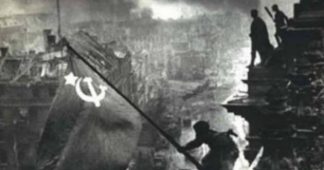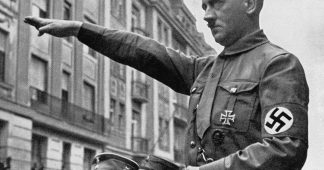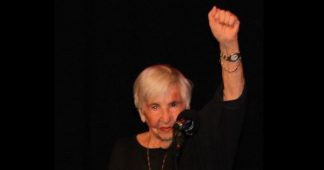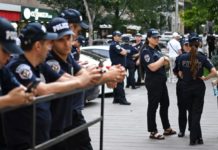The important role that artists and their works played and still play in the anti-fascist struggle is testified to by one of the most important German-language writers, Bertolt Brecht, who died 65 years ago on August 14, 1956. He wrote famous plays dealing with German fascism in exile and after his return to Germany in the early 1950s.
Born in Augsburg on February 10, 1898, Brecht became one of the most important German-language political dramatists as early as the Weimar Republic. With his plays about the November Revolution (“Drums in the Night”), or the plays critical of capitalism, “Three penny Opera” and “St. Joan of the Slaughterhouse,” Brecht became not only popular, but also a Nazi opponent. On several occasions, theater and film performances (e.g. “Kuhle Wampe oder Wem gehört die Welt?”) were disrupted by rioting by SA commandos in the early 1930s.
With the handing over of power to the Nazis on January 30, 1933, Bertolt Brecht fled via Prague and Paris, later going into exile in Denmark. From there, he saw his poetry and plays burned at the stake in the fascist book burning on May 10, 1933.
While his family was able to live in Svendborg (Denmark), he was active in the circle of German-speaking exiles in Paris, where he premiered his anti-fascist plays. These included, above all, the scenes “Fear and Misery of the Third Reich”, with which he described the reality of German fascism, or the drama “The Rifles of Mrs. Carrar”, which was written during the Spanish Civil War and clearly took a stand for the defense of the Republic against the Franco coup.
Other plays that are still famous today, such as “The Life of Galileo”, which deals with the defense of science and knowledge, the anti-war play “Mother Courage and Her Children” or the enlightenment play “The Good Man of Sezuan”, he wrote during these years. In these dramas, Brecht put into practice his understanding of epic educational theater.
Since the threat posed to him by the fascist war policy had increased significantly since 1939, he went first to Sweden in 1939, then to Finland, before he receiving an entry visa for the USA in May 1941.
There he met again the composer Kurt Weill, with whom he had already worked in the Weimar Republic. This gave him the opportunity to work in the anti-fascist oriented art scene. There he began his drama “Schweyk in the Second World War”. Together with the director Fritz Lang he created the film “Hangman also die” in Hollywood. It was an appreciation of the assassination of Reinhard Heydrich in Prague and the anti-fascist resistance in the occupied countries.
In November 1947, accused in the United States of “un-American activities,” he returned to Europe. Since he was not allowed to enter the West Zone, he decided to go to the SBZ in 1948, where he built up the Berliner Ensemble, which he directed until his death in 1956.
He was always convinced that the rule of fascism could not last. Already in 1941, when German fascism was experiencing its greatest expansionist expansion with the invasion of the Soviet Union, Brecht formulated the following message in the epilogue of his work “The Resistible Rise of Arturo Ui”:
“But you learn how to see, instead of staring and acting, instead of talking still and still.
Such a thing would have once ruled the world!
The peoples became his master, however, that none of us triumphs there too early –
The womb is still fertile, from which that crawled.”
This quote has been repeated thousands of times in the 75 years since the military liberation from fascism, because it makes it clear that anti-fascist vigilance and anti-fascist action are and remain necessary today.
For this, anti-fascists all over the world are indebted to Bertolt Brecht.











